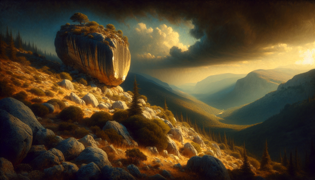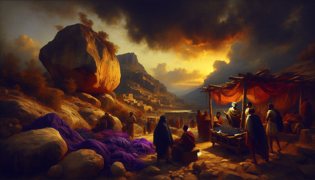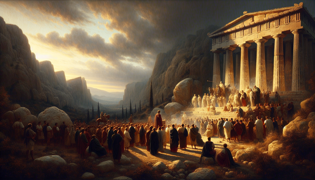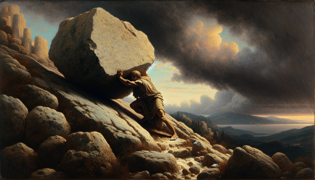Sisyphus: The Endless Climb
Reading Time: 13 min

About Story: Sisyphus: The Endless Climb is a Myth from greece set in the Ancient. This Dramatic tale explores themes of Perseverance and is suitable for Adults. It offers Inspirational insights. A dramatic retelling of Sisyphus’s eternal punishment under the Greek gods.
Introduction
Beyond the salt‑etched cliffs of Corinth, Sisyphus lingered where sea‑foam clashed against stone like clattering shields. His breath came in ragged gusts, as if each inhalation weighed the weight of his crime. The parched wind carried the sharp tang of brine and wild oregano, teasing the nostrils. In the distance, a shepherd’s flute wove a lonely aria, a faint murmur through the dusty haze.
Sisyphus once possessed a silver tongue that glinted like moonlight on the Saronic Gulf. He’d outwit sailors and gods alike, selling lies as though they were jars of honey. Yet Zeus, angered by repeated trickery—kefi for mischief turned divine ire—condemned him to an eternity of ceaseless labour. Now the boulder waited at the hill’s base, its surface pitted and cold like an old warrior’s shield.
Each dawn, he would grasp that stone with hands calloused to the bone, its rough texture cutting his palms. Opa, he muttered, bracing against its weight. An echoing rumble rolled through the valley as he began his ascent. Every inch felt as stubborn as ash dancing at twilight, every droplet of sweat tasted of salt and regret.
No companion walked beside him—no parea to share the burden. The gods watched in silent judgement from marble thrones veiled in storm clouds. Thunder grumbled on the horizon, promising swift retribution if he faltered. Yet in the bone‑deep ache of muscles, in the metallic tang of fear, a quiet spark of defiance remained.
Here begins the chronicle of a mortal condemned to challenge eternity. Against relentless gravity and divine decree, Sisyphus summons every ember of resolve. With horizon‑slanted light gilding his sorrow, the stone’s promise of descent hovers like a spectre. His tale is etched in sweat and granite, whispering that even in ceaseless toil, hope may yet flicker.
The Silver Tongue of Corinth
Long before Sisyphus met his stone, Corinth buzzed with merchants hawking purple‑dye cloth and brackish wine. He moved among them like a songbird, voice melting doubt with each syllable. Folk said he could coax a secret from stone itself. One market morning, the scent of figs and roasting lamb drifted through the square, mingling with the tang of sea spray. A merchant’s velvet pouch slipped from his belt—so light, so slight—yet Sisyphus detected its absence by a thread of intuition.
He claimed the pouch contained a token from Zeus, glittering like a shard of sunrise. The merchant, half‑drunk on hubris, fell to his knees, pleading. Onlookers whispered, eyes bright as polished bronze. In triumph, Sisyphus raised a mocking salute. Yet behind that confidence, his mind churned like a whirlpool in the Saronic Gulf. He once tricked Thanatos himself into a silver cage, delaying death’s embrace by daring a wager with Hades. But mortal cunning can only dance so close to the gods before their scorn falls like thunderbolts.
On nights when the lamps of Corinth flickered low, Sisyphus climbed to the temple of Ares. There, his heartbeat hammered against marble columns. He offered prayers as hollow as driftwood, wagering with destiny as though it were a tavern game. He strode across bronze shields and chipped idols, the hush broken only by the distant howl of wind through ancient doorways. Each step cast echoes like desperate whispers begging for mercy.
Yet Zeus, high upon Olympus, perceived every deceit. His decrees rode on lightning and thunder, seeping into the marrow of rocks and trees. One evening, the air tasted of ozone and iron—an omen no seer could ignore. A herald descended, voice echoing like rolling hail, summoning Sisyphus to stand before divine judgement.
By the shrine’s flickering torchlight, Sisyphus stood tall, chest swelling with defiance. He could feel the heat of molten guilt at his back. When Zeus’s verdict fell—eternal toil—his words hissed like steam escaping a caldron. Yet beneath the fury, a curious ember glowed. He bowed his head only to steel his spine, for stone would bruise flesh but never shatter a will forged in audacity. In that charge lay the seed of his endless trial.
Because mortals chatter like sparrows in the sun, Zeus decreed that Sisyphus’s cunning must meet unbreakable fate. And so the boulder waited at the hill’s foot, its pale surface mottled like an ancient sea turtle’s shell, thirsty to taste his flesh. A hush settled over Corinth, warm as a mother’s embrace, and Sisyphus felt the gravity of doom settle upon his shoulders like a crown of iron.

The Punishment Decreed
From marble pillars piled like fallen giants, the herald’s proclamation thundered across the agora. A hush fell, heavy as wool blankets in winter. The scent of burnt offerings lingered, interlacing with dust and crushed olive leaves. Townsfolk froze, eyes wide as harvest moons, as the speaker invoked Zeus’s infinite wrath. “Sisyphus of Corinth,” he intoned, voice layered like granite and echo, “for crimes of deceit against mortal and divine, you shall push a weight eternal.”
A tremor flickered through the square, as though the earth itself recoiled from the verdict. Sisyphus met the decree with measured calm, shoulders squared against fate’s gale. He could taste rebellion in the air—acrid smoke of incense spiked with fear. Each syllable carved itself into his memory like crude runes on sandstone. The crowd parted, onlookers scattering like startled horses as guards seized him in iron snares, their surfaces slick with dew-like sweat.
Dragged through streets slick with oil from festival lamps, Sisyphus’s footsteps left wet prints on flagstones. The clank of his shackles harmonised with distant chanting from a nearby temple—an eerie counterpoint, as if gods and mortals wrestled for his soul. Twilight unfurled, staining the sky violet and ash. A mournful wind sighed through columned walkways, carrying the faint rumble of the sea.
By dawn’s first glow, he found himself before the infamous hill at Tartarus’s edge. The boulder—a sphere of pale limestone as vast as a fallen mountain—rested in the cold grass. Its surface was pocked and rough, like the face of an ancient giant hardened in battle. He knelt, brushing his calloused palm across its ridges. The crackle of birdsong echoed on the breeze, incongruous against the weight of doom.
Echoes from Olympus crackled overhead—an unseen audience of gods wagering on his fate. Lightning sizzled in the distance, thirsting for his resolve. Yet Sisyphus drew breath as steady as a rower’s oar, determined to challenge the edict. He placed hands upon the stone, fingers digging into its crevices. The earth quivered, as though reluctant to bear the burden of his transgression.
Rising to his feet, he lifted with every sinew aflame. His muscles protested in hoarse groans, each fibre singing of defiance. Above, storm clouds gleamed like watchful eyes. He advanced a single step, then another, heart thudding like war drums beneath his ribs. For a moment, the world held its breath. In that pregnant silence, a whisper of hope flickered—he might yet outwit the inevitable descent. But the gods, ever vigilant, awaited the instant his will faltered.

The Hill of Torment
Sisyphus’s first ascent began beneath bruised skies, thunder murmuring like distant war horns. The hill’s slope rose steeply, studded with fractured limestone and thorny shrubs whose sap smelled bitter and sharp. Every footfall sent gravel tumbling like startled lizards skittering away. His palms burned where they pressed against the stone, finding purchase only in the jagged hollows that scraped his skin raw.
He paused mid‑climb, sweat falling in rivulets that tasted of iron and salt. The air thrummed with an electric charge, the scent of ozone prickling his nostrils. In moments like this, he felt the weight of mortal flesh against immortal decree. The boulder’s bulk was implacable, a marble leviathan awaiting its prey.
Birdsong fractured the hush—delicate notes weaving through the thunder’s growl. Yet that faint melody stung his heart; it spoke of freedom unattainable. He pressed on, sinews straining, each breath rasping like wind through bleached reeds. A shard of sunlight tipped the stone’s crest, illuminating scratches—marks of former attempts, faint as ghostly runes.
As he climbed, his mind drifted to his wife, Merope, her laughter once brighter than Hephaestus’s forge. He recalled how she washed his cloak by the fountain at dawn, her hair smelling of lavender and fresh water. The memory was a soft flame in the brittle gloom. Yet that solace flickered—hope offered then snatched away by the stone’s relentless advance.
Halfway up, the slope narrowed, the earth slick where rain had just cleansed it. Mud sucked at his sandals, pulling one foot back as he reached for a crevice. His grip slipped; a spin of gravel rattled downwards like tumbling bones. He caught the boulder’s edge with a final burst of strength, heart pounding thunderous hymns.
The gods observed from cloud‑shrouded thrones, their gaze like shards of frost. A single drop of rain plinked onto the rock, cool and heavy against his palm. He swallowed hard, tasting the bitter tang of dread. Yet in that instant, something within him stoked anew—a stubborn ember of defiance refusing to dim.
Scar tissue on his hands reminded him of past battles: wrestlings with Thanatos, narrow escapes from death’s grasp. He pressed onward, each careful step an act of rebellion. The horizon trembled, distant peaks tinged rose as day broke at last. In that light, the boulder gleamed like a captive sun, daring him to claim victory he knew was forbidden.
He stumbled onto the summit, ribs burning as if aflame. For a heartbeat, triumph bloomed within his chest—only to crack and spill when the stone shifted, claws of gravity dragging it earthward. With a hollow rumble, it tumbled back, shattering the silence. Dust rose in a grey plume, coating his shoulders like a funerary shroud. The hill lay empty save for him, kneeling amid jagged stones and fresh echoes of failure.
Breath heaving, he gazed westward where sky met sea in a distant line of promise. The gods might bind him, but within each fall, a rebirth flickered—proof that even in eternal punishment, the human spirit may yet burn.

Hope in the Heavens
After countless ascents, bloodied hands, and thunder‑laced skies, Sisyphus rose each morn with an ember of stubborn hope. On one such dawn, the horizon flared gold, hue like melted brass. A shaft of sunlight struck the boulder’s crest, setting it aflame with radiant fire. The stone shimmered, almost crystalline, as though gods themselves tried to hint at mercy.
He felt the prick of awe, mingled with dread and longing. Around him, the olive trees whispered in the breeze, leaves brushing like whispered confidences. The air carried the heady perfume of nearby blossoms—oleander blooms spiking the wind with sweetness. In that infusion of life, melancholy twinged: even nature marked his torment, yet offered beauty to mock it.
Sisyphus cradled the boulder’s base, searching for cracks that might ease his burden. His fingertips grazed a faint crease shaped like a serpent’s spine. He pressed inside, mind racing. “For kefi,” he muttered—an ironic invocation of joy before such travail. He drew back, feeling earth pulse beneath him, as if the hill itself urged him on.
Each upward step felt softer, as though the stone gleaned strength from the dawn’s glow. His heart drummed a furious aria against his ribs. The wind carried distant bells from a coastal temple, each toll a measured heartbeat echoing his own. The texture of granite was cool, slick as fish scales, resisting every push.
At last, he neared the summit. A sudden hush fell, as though gods paused their eternal vigil to observe this fragile spark of hope. A single bird swooped low, calling out a plaintive cry. Sisyphus seized upon the moment: he summoned every ounce of defiance, pushing with arms aflame and legs trembling like reeds in a gale.
The boulder surged upward, inch by agonising inch. The summit brightened, sky streaked with violet and rose. He felt triumph coil around his spine—a fleeting vine of exultation. The crowd of gods, veiled by clouds, seemed to lean forward, silent as statues. His breath came in staccato bursts, each exhale sharp as flint.
Then, as if commanded, gravity reclaimed its due. The boulder’s base slipped, and with a groaning roar like breaking earth, it plunged back down. Sisyphus fell to his knees, heart pounding thunderous grief. Dust settled in lazy swirls, scented faintly of limestone and crushed thyme.
He lay for a moment amid the wreckage, chest heaving. A tear traced down his cheek, warm against chalky dust. Yet in that ruin, a curious calm blossomed. He rose unsteadily, muscles quivering. Though defeated, he had felt the taste of triumph—and in that taste lay proof he was not wholly broken.
From the crest, he gazed eastward where sun and sea met. Lightning cracked in distant skies as if gods reminded him of their dominion. Still, Sisyphus smiled faintly, wiping dust from trembling lips. Even condemned, he had discovered that hope, once struck, is as stubborn as granite itself. He would rise again.

Conclusion
When the boulder boomed its tenth—or was it the thousandth?—descent, Sisyphus knelt among shattered stones and whispered prayers to gods who never answered. His shoulders bore the patina of endless effort: scars that mapped his defiance like constellations across a bruised sky. The air smelled of crushed thyme and dust, faint murmurs of wind threading through the stones.
In that silent vigil, he realised the truth: punishment moulded him, but perseverance defined him. No thunderous decree could shatter the spirit he forged with every heave. Even if the stone rose and fell a million times beyond mortal ken, each ascent became an act of rebellion—a testament that the heart, once kindled, refuses to fade like dying embers.
Thus, in the hush between storms, Sisyphus rose anew. He braced against the boulder’s bulk, fingers plunging into familiar crevices. Around him, the olive trees bent in approving hush, and distant waves applauded with spume‑kissed bursts on hidden shores. He pushed, step by grueling step, forging hope from agony.
No final triumph awaited him—only the endless slope and the echo of his own footsteps. Yet within each push lay an affirmation: that to persist, in defiance of fate, is to claim mastery over despair. For though the gods may bind the flesh, they can never enslave the will.
And so Sisyphus, cursed to labour without end, discovered freedom in ceaseless endeavour. Each dawn he ascended, not for victory, but for the quiet dignity of struggle itself. In his tireless climb, he became the very symbol of perseverance, a shining spark in the abyss. His tale remains, echoing through marble halls and olive groves, reminding mortals that even in eternal hardship, hope endures.

















